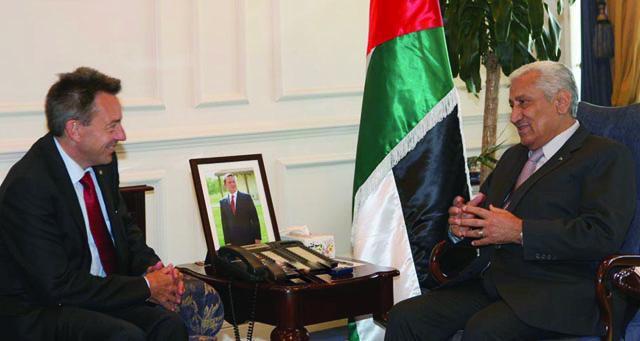You are here
Red Cross chief sees Syria aid shift towards ‘rehabilitation’
By AFP - May 03,2018 - Last updated at May 03,2018
GENEVA — Providing humanitarian aid in war-ravaged Syria looks set to shift increasingly away from emergency, life-saving assistance towards rehabilitating devastated areas to help Syrians return home, the head of the Red Cross said Wednesday.
Peter Maurer told reporters in Geneva that the conflict appeared to be entering a new stage, with fewer “big-battle” moments and perhaps even a chance to provide displaced Syrians with a sense of normalcy after seven years of devastating violence.
“Syria to us looks very different from Syria last year or from Syria two years ago,” Maurer said.
Syria has been torn apart a war that has left more than 350,000 people dead and displaced millions.
But Maurer said that as the situation in many parts of the country appears to be stabilising, he expected to see a shift away from a pure focus on emergency assistance towards reestablishing services in areas people want to return to.
“For us it is just important that we get the rehabilitation thing going,” he said.
Maurer pointed out that Syria now appeared to be split into fairly clearly defined territories, and said the “big actors” seemed ready to work towards “consensus to stop the war and to go into a phase of more tranquility”.
‘Post-big-battle era’?
“I have the impression we are at a little bit of a threshold moment,” he said, adding that he believed “we are entering the post-big battle era”.
The Damascus regime has retaken large parts of Syria since 2015 with Russia’s backing, but opposition groups with Western backing still control most of the northern Idlib province.
Turkey also controls an area in the north after launching an operation into Syria in January to root out the Kurdish People’s Protection Units (YPG) militia in the Afrin enclave.
Maurer acknowledged that the situation could still spiral in a “dangerous” direction.
But he said his recent visits to Moscow and other capitals had convinced him there was now a “minimal consensus” to stabilise the country.
Despite a relative calm in a number of places across the country, Maurer stressed that “humanitarian assistance [must] continue to go into Syria, because... there are a lot of humanitarian needs”.
But he said the nature of the assistance would evolve in many places away from pure emergency assistance towards “protection activities”.
Chance of normalcy?
Such activities include helping reestablish basic services, assisting people to find lost family members and also help provide protection to avoid communities coming under attack.
ICRC said it had received some 13,000 tracing requests from people looking for loved ones since the start of the conflict, with the number of requests soaring 25 per cent in 2017.
This increase, Maurer said, indicated that people were no longer focused only on emergency needs but could concentrate more on broader necessities.
These include reestablishing basic services in relatively stable areas that people want to return to, he said.
Maurer insisted that this should not be seen as a reconstruction bid — a controversial issue that is politically fraught, with widespread disagreement on whether to work with the regime of President Bashar Assad to rebuild the country.
“When you bring a mobile medical clinic in to a destroyed city in Syria to which people are returning, that is not reconstruction. That is to us rehabilitation.”
Maurer said he believed there was “the chance in Syria, with a little bit of support to bring back normalcy to Syrians”, adding though that “just to do minimal humanitarian assistance won’t do the trick”.
Related Articles
GENEVA — Syria is unlikely to see a major "Marshall Plan" for reconstruction as peace remains elusive despite hundreds of thousands more civ
Deputising for His Majesty King Abdullah, Prime Minister Abdullah Ensour met on Monday with International Committee of the Red Cross (ICRC) President Peter Maurer and discussed international support to Jordan.
Red Cross chief Peter Maurer voiced alarm Saturday over the chaos surrounding the evacuation from the besieged Syrian city of Homs, urging the warring sides to respect basic humanitarian law.


















